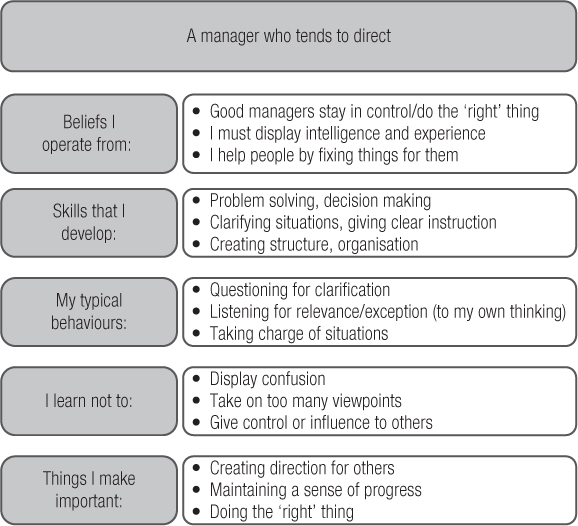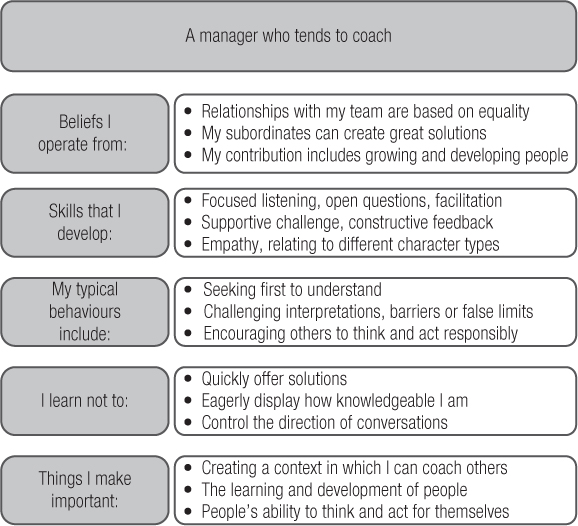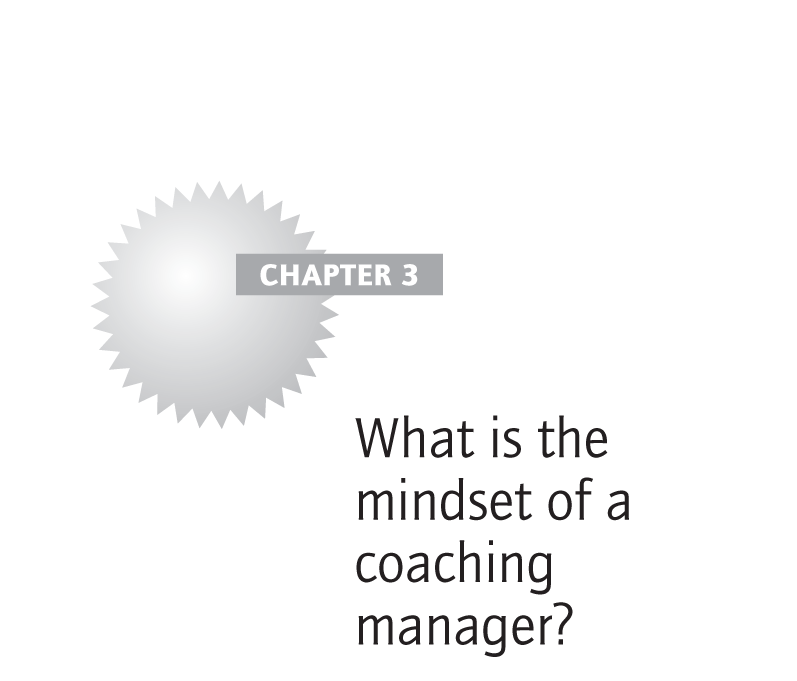In this chapter we’ll look at the supporting values and beliefs that drive your management style and behaviour. I’ll encourage you to reflect on what you believe it means to be a manager, because knowing what style of manager you currently are, and what kind of manager you’d like to be, will help you develop. We’ll look at traditional directive models of management alongside the values that underpin a coaching style of manager.
First let’s look at how you think you add value as a manager. For example, if you believe ‘My team value my experience and my ability to give them an expert opinion’, then that’s going to encourage you to always give your opinion. Or if you think that being a manager means helping your team to be successful, then your everyday actions will reflect that. When we decide to operate from different principles or develop new skills, we first need to know what our typical tendencies are, so we can change them. Because when we are self-aware, we have a greater sense of choice.
What beliefs cause us to be a highly directive manager?
There is a subtle pressure that goes with being the most senior person in the team. And that pressure is that you know everything, or at least the ‘right’ thing. After all, they made you the manager, didn’t they? Even when you do have all the answers, and that’s possible, sometimes you add more value to your team when you encourage them to find those, or different, answers on their own.
Let’s look at the underlying assumptions a directive manager might have and the behaviours that flow from those. Figure 3.1 illustrates the values and beliefs of a highly directive manager, and predicts skills and behaviours that result.

Figure 3.1 Values, beliefs and behaviours of a directive manager
This mindset is not bad or wrong; there are times when this directive model creates positive leadership. Sometimes direction and instruction gives people confidence and clarity. In the armed forces a directive model suits many situations, including combat. Interestingly, both the US and UK military have tangible interest and activity in coaching and mentoring styles of leadership. This is because, over time, the directive model exposes pitfalls in the relationships and results it creates. These pitfalls include:
- The leader/manager puts themselves under pressure to know everything and ‘be right’ all the time.
- The team assume that the leader/manager wants to be involved and ‘give answers’, which takes more of the manager’s time and can result in a ‘fire-fighting’ type of role for the manager.
- In their tendency to rely on the leader/manager, the team appear lazy, demotivated or lacking in confidence, which causes frustration for the manager, for example ‘I sometimes feel like I’m nursemaid’.

Facilitation
To facilitate a conversation is to help guide it through to a logical completion. A facilitator is focused more on the process of the conversation than the content of it: their role is to guide an individual or group through the planned stages of the conversation. In a pure facilitation role, you do not contribute any content to the discussion yourself, you simply encourage the group to stay focused, keep the discussion relevant, close down or open up conversation, keep time, etc. Your priority is to make the session effective by supporting others to think something through effectively.
What beliefs help you to be a coaching manager?
Managers who adopt a more consistent coaching style operate from a distinct set of assumptions or beliefs. These beliefs enable them to relax some of the pressures to know everything or to control and direct. Coaching managers place value on people’s ability to think and act for themselves, or their own need to create conditions in which their team will be successful. Your beliefs affect your sense of priority, on an everyday basis. For example, as a coaching manager you want to make sure that people have what they need to do a great job, develop and thrive. That might be a shared vision, a sense of engagement, or the new skills they need to create better results. The basic starting point might be ‘What do they need to succeed?’ rather than ‘How do I make sure everyone’s doing the right thing?’ It may not seem a huge difference, but over time it shapes your attitude and approach. It’s a little like altering the course of a ship by a few degrees: fairly quickly you end up somewhere completely different. Figure 3.2 looks at the values and beliefs of a coaching manager and predicts skills and behaviours that result.

Figure 3.2 Values, beliefs and behaviours of a coaching manager
As a manager, when you believe that much of the value you add is to develop the people around you, then you more naturally develop the skills of a coach. For example, in one-to-one meetings with individual team members you’ll tend to focus on them in relation to the situation, rather than just the situation. In team meetings, you’ll facilitate the discussion more than direct it, preferring to encourage team members to be more constructively involved. To a coaching manager, people’s ability to be engaged, and to think for themselves, is more important than displaying their own knowledge.
Developing your own style
The purpose of offering these two models is not to show either as right or wrong but simply to highlight the impact of a manager’s worldview. Indeed, it’s likely that you may blend the two styles in a way that works for you, and Chapter 8 (‘A flexible style of influence’) is designed to help you do just that. Please remember that a lack of ability to coach will create a false limit upon you. When you have the skill to manage in both a directive and non-directive way, you can adapt to situations and people to produce consistently good results. Develop real flexibility and you have true choice.
![]()
What are you making important?
Use the following questions to assess your own style of management.
Q: For you, what are the main skills of an effective manager? What must they do well?
Q: How equal do you feel to the individuals in your team? Or how parental do you feel towards them?
Q: When people around you make mistakes, how do you typically react?
Q: Under what conditions would you be comfortable with your team learning though mistakes?
Q: Reflecting on the two previous models (directive and coaching manager), which values and beliefs do you recognise as being relevant to your own?
Q: How does the pressure of a situation affect your ability to stay relaxed and flexible, in terms of your managing style?
Q: What three things could you do more of, or less of, that would improve the effectiveness of your management style?
If you’re comfortable, ask the opinion of someone you trust to offer additional ideas or insights.

What is the mindset of a coaching manager?
As you develop the skills and behaviours of a coach in the workplace, it’s important to consider how you think you add value in your role. Your typical behaviours and responses are affected by what you think is important. If you want to be perceived as an expert or one who rescues situations, then behaviours such as explaining less and asking more come less naturally. As an expert or rescuer you are more likely to develop a directive style of giving ideas, opinions and solutions.
When you are aware of the beliefs or values that drive your behaviour, you can make adjustments. This might be as simple as remembering that ‘Their ability to think is more important than my “helping” by giving ideas’. When you focus on the beliefs of a coaching manager, you are more likely to interrupt your impulse to be directive and can then coach people instead.

